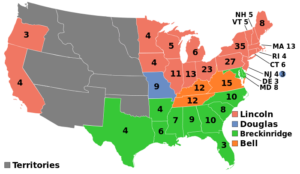Good morning, Whitewater.
Sunday in town will be sunny with a high of sixty-seven. Sunrise is 6:37 AM and sunset is 4:39 PM, for 10h 02m 48s of daytime. The moon is a waxing crescent with 37.3% of its visible disk illuminated.
On this day in 1860, Americans elect Abraham Lincoln president of the United States:
Presidential Election 1860. Red shows states won by Lincoln, green by Breckinridge, orange by Bell, and blue by Douglas. Numbers are Electoral College votes in each state by the 1850 Census.
Voter turnout was 81.2%, the highest in American history up to that time, and the second-highest overall (exceeded only in the election of 1876).[16][17] All six Presidents elected since Andrew Jackson won re-election in 1832 had been one-term presidents, the last four with a popular vote under 51 percent.[18] Lincoln won the Electoral College with less than 40 percent of the popular vote nationwide by carrying states above the Mason–Dixon lineand north of the Ohio River, plus the states of California and Oregon in the Far West. Unlike all of his predecessors, he did not carry even one slave-holding state, and he received no votes at all in ten of the fifteen slave states.
The Republican victory resulted from the concentration of votes in the free states, which together controlled a majority of the presidential electors.[19] Population increases in the free states had far exceeded those seen in the slave states for many years before the election of 1860, hence their dominance in the Electoral College. The split in the Democratic party is sometimes held responsible for Lincoln’s victory,[20] but he would still have won in the Electoral College, 169 to 134, even if all of the anti-Lincoln voters had united behind a single candidate. In the three states in which anti-Lincoln votes did combine into fusion tickets, Lincoln still won in two states and split the electoral vote of New Jersey. At most, a single opponent nationwide would only have deprived Lincoln of California and Oregon (both of which he only won via a plurality of the statewide vote), whose combined total of seven electoral votes would have made no difference to the result; every other state won by the Republicans was won by a clear majority of the vote.[21]
Like Lincoln, Breckinridge and Bell won no electoral votes outside of their respective sections. While Bell retired to his family business, quietly supporting his state’s secession, Breckinridge served as a Confederate general. He finished second in the Electoral College with 72 votes, carrying 11 of 15 slave states (including South Carolina, whose electors were chosen by the state legislature, not popular vote). He won a distant third in national popular vote at 18 percent, but he accrued 50–75 percent in the first seven states that would become the Confederate States of America and took nine of the eleven states that eventually joined.[22]
Bell carried three slave states (Tennessee, Kentucky, and Virginia) and lost Maryland by only 722 votes. Nevertheless, he finished a remarkable second in all the slave states won by Breckinridge and Douglas. He won 45–47 percent for Maryland, Tennessee and North Carolina and he canvassed respectably with 36–40 percent in Missouri, Arkansas, Louisiana, Georgia, and Florida. Nonetheless, he came in last in the national popular vote at 12 percent.
Douglas was the only candidate who won electoral votes in both slave and free states (free New Jersey and slave Missouri). His support was the most widespread geographically; he finished second behind Lincoln in the popular vote with 29.5 percent, but last in the Electoral College. Douglas attained a 28–47 percent share in the states of the Mid-Atlantic, Midwest and Trans-Mississippi West, but slipped to 19–39 percent in New England. Outside his regional section, Douglas took 15–17 percent of the popular vote total in the slave states of Kentucky, Alabama and Louisiana, then 10 percent or less in the nine remaining slave states. Douglas, in his “Norfolk Doctrine”, reiterated in North Carolina, promised to keep the Union together by coercion if states proceeded to secede. The popular vote for Lincoln and Douglas combined was 70% of the turnout.
On this day in 1837, a city in Iowa becomes the Wisconsin Territory’s temporary capital:
1837 – Burlington, Iowa Selected as Temporary Capital
On this date Burlington, Iowa was chosen as a temporary capital of the Wisconsin Territory. A year earlier, legislators offered a bill making Madison the capital with a temporary capital in Dubuque until which time a permanent building could be constructed in Madison. Legislators also proposed the City of Belmont as a temporary capital. One month later, on December 12th, a fire destroyed the two-story temporary capital in Burlington. The new legislature moved its headquarters to the Webber and Remey’s store in Burlington where they conducted government affairs until June 1838.[Source: State of Wisconsin Blue Book]

